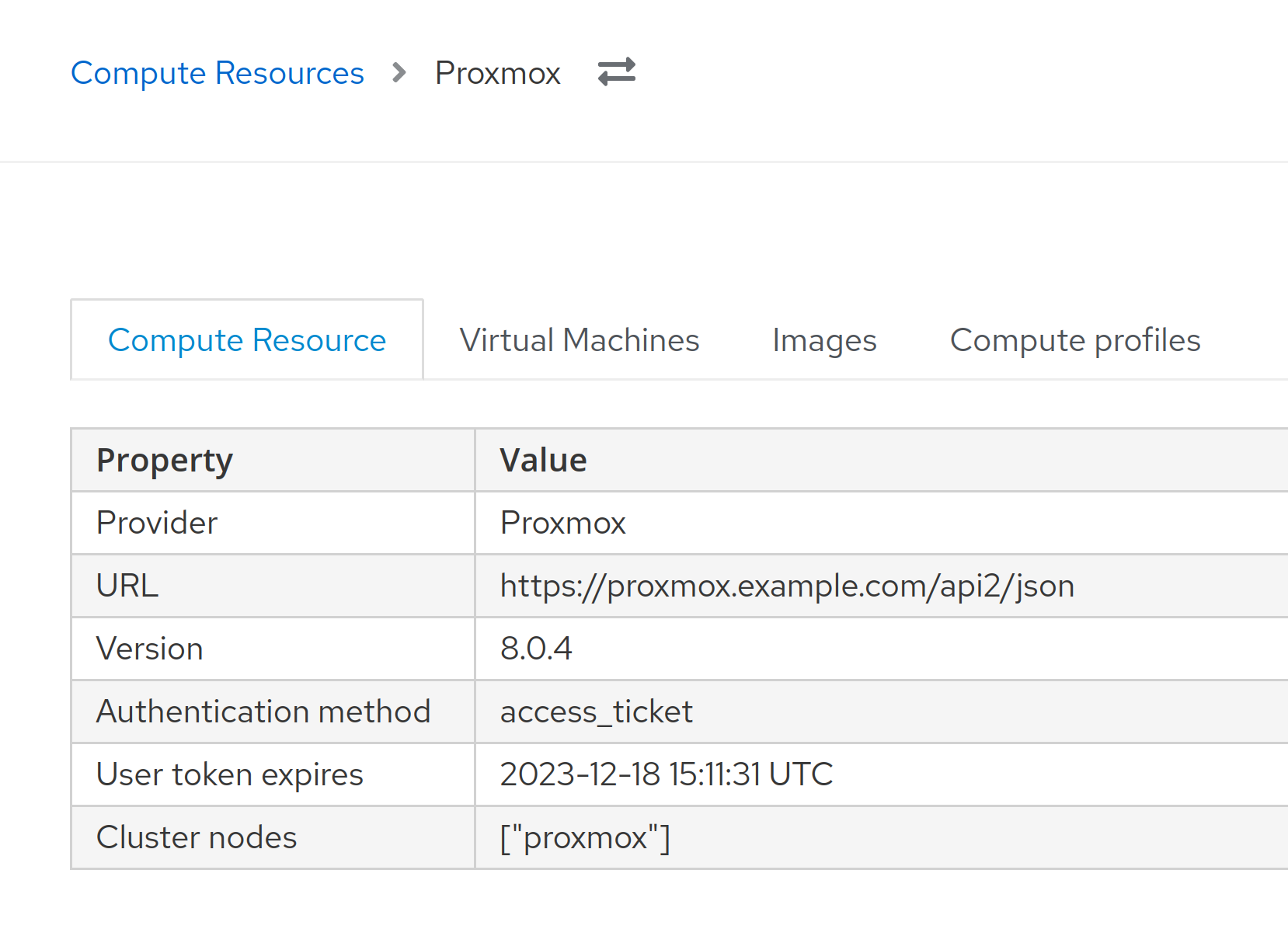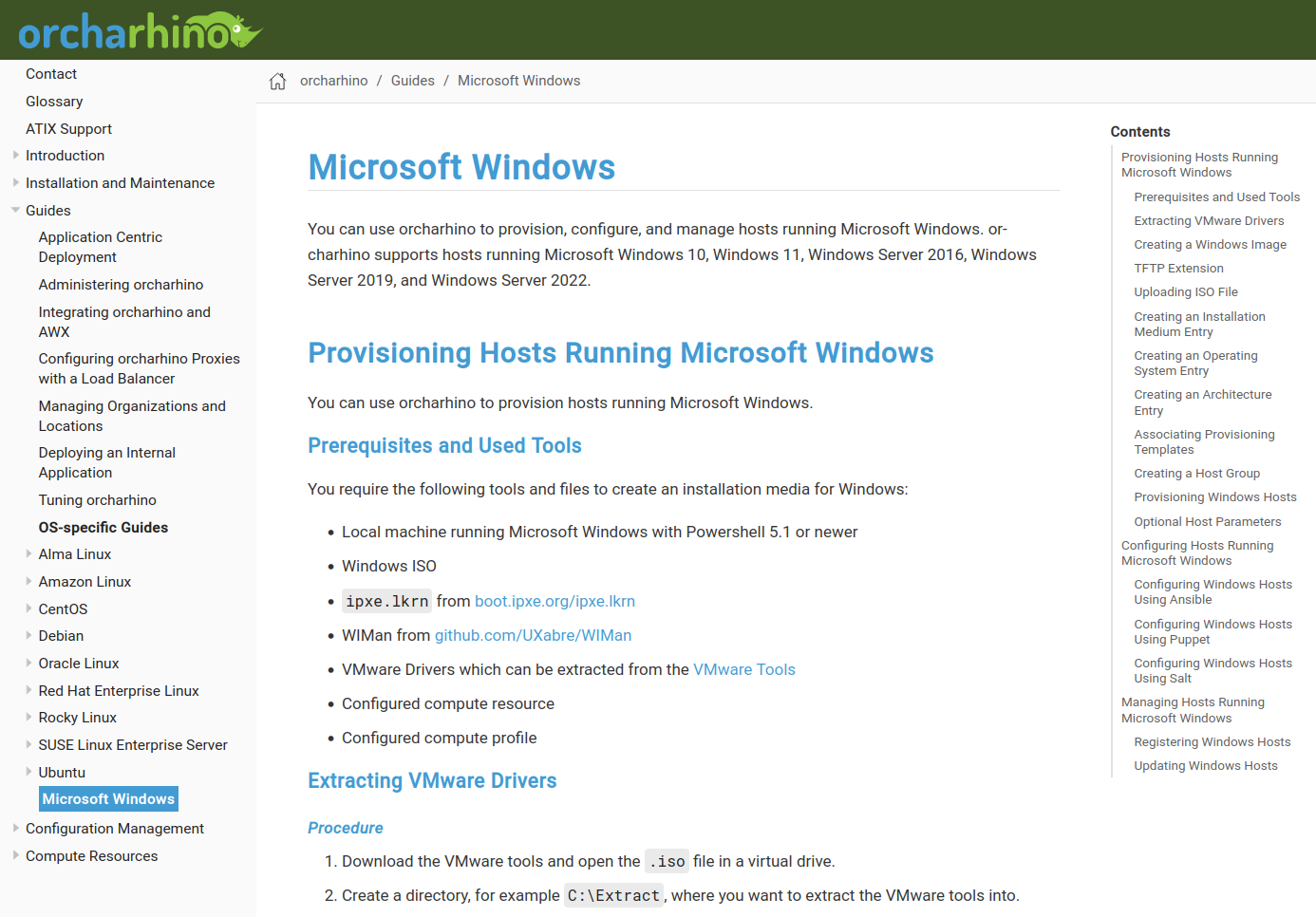Release Notes
orcharhino 6.7.0 is here!
Highlights
orcharhino Performance Improvements
- We have improved the performance of orcharhino Server and orcharhino Proxy. When you view the “All Hosts” list in the orcharhino management UI, you will notice a shorter loading time. For instance, we have reduced the number of API requests that happen in the background.
- A database optimization accelerates the publication of repositories using the download policy “On Demand”.
Compute Resources: new hypervisor compatibility
- You can now use Proxmox 8 as a compute resource to provision your hosts.
- orcharhino is now able to interact with VMware 8 U2 and to deploy hosts using boot disk based provisioning.
Managing Windows hosts with orcharhino
- We added documentation on how to configure, update, and register hosts running Microsoft Windows. For more information, see https://docs.orcharhino.com/or/docs/sources/guides/microsoft_windows.html
orcharhino can interact with Proxmox in the current version 8 providing the same functions you already know from version 7.
Learn how to provision, configure and manage hosts running Microsoft Windows
Changelog Features
- Allow synchronization of Yum repositories that use the new zstd (Zstandard) compression algorithm.
- Added orcharhino Clients for Red Hat Enterprise Linux 9 on PPC64LE.
- Added packages for PDSH to the orcharhino extras repositories.
- Added an option for associating individual Proxmox VMs to hosts.
Changelog Bugfixes
- Fixed a bug that prevented orcharhino installations from being completed if DHCP and DNS were disabled.
- Fixed upgrade to Puppet 7 using orcharhino-maintain.
- Hide Snapshots for unassociated hosts.
- Fixed a bug that prevented users from updating virt-who-configurations.
- Fixed a bug that – after changing the URL of a Yum repository using the On-Demand-Policy – led to orcharhino trying to download packages from the previous URL.
- Allow rendering of Provisioning Templates for SUSE Linux Enterprise Server without having specified or_client_repo_path or or_client_repo_url.
- Improved synchronization of DEB content with duplicate packages to orcharhino Proxies. In rare cases, duplicate packages such as „vim.deb“ and „sub-directory/vim.deb“ caused synchronization failures.
- Republish repository metadata even if no packages were downloaded to recover from failed synchronizations.
- Upload facts of Debian and Ubuntu hosts to orcharhino immediately after provisioning.
- Fixed a bug that prevented hosts from being deployed on Proxmox when bootdisk based provisioning was selected.
- Fixed a bug that prevented users from editing hosts if a LUN was directly attached to an oVirt/RHV VM.
- Hide VM tab for unassociated hosts.
- Fixed a bug preventing users from performing „Rebuild host“ as a bulk action.
- Added package pulp_manifest which is required for creating file type repositories from local files. For more information, see https://docs.orcharhino.com/or/docs/sources/guides/almalinux/managing_content/managing_custom_file_type_content.html#Creating_a_Local_Source_for_a_Custom_File_Type_Repository_content-management
- Increased the timeout for downloads during orcharhino installations to account for slower internet connections.
- Fixed warnings in „install_orcharhino.sh“ used to install orcharhino Server.
- Fixed a bug within orcharhino management UI to allow adding and editing more than two disks when provisioning a host on Proxmox.
- Fixed a bug that was responsible for broken links from the page „SUSE Subscriptions“ to existing repositories.
- Fixed a bug in Application Centric Deployment which prevented task information from being shown during host provisioning.
Changelog Documentation
- Documented shellscript usage to create OS entries on orcharhino. For more information, see https://docs.orcharhino.com/or/docs/sources/guides/ubuntu/provisioning_hosts/configuring_provisioning_resources.html#Creating_an_Installation_Medium_for_Debian-Ubuntu_provisioning
- Updated the path of the PostgreSQL database used by Pulp on orcharhino Server and orcharhino Proxies. For more information, see https://docs.orcharhino.com/or/docs/sources/installation_and_maintenance/installing_orcharhino_server.html#System_Requirements
- Documented the or_proxy_installation Ansible role to install orcharhino Proxies. For more information, see https://docs.orcharhino.com/or/docs/sources/installation_and_maintenance/installing_orcharhino_proxy.html#Installing_the_orcharhino_Proxy_Packages
- Removed „httpie“ and „jq“ as requirements for „bootstrap.py“ for Debian and Ubuntu. For more information, see https://docs.orcharhino.com/or/docs/sources/guides/ubuntu/managing_hosts/registering_hosts.html#Registering_Hosts_Using_the_Bootstrap_Script
- Adjusted documentation on how to configure orcharhino Server to use Salt for configuring managed hosts. For more information, see https://docs.orcharhino.com/or/docs/sources/configuration_management/salt.html
- Documented orcharhino Server upgrades in disconnected environments. For more information, see https://docs.orcharhino.com/or/docs/sources/installation_and_maintenance/upgrading_orcharhino_server_offline.html
Deprecations
- We no longer maintain the orcharhino Client for SLES 12 SP4 due to SUSE no longer providing any security updates. If you have the orcharhino Client synchronized, you can continue using it. If you plan to upgrade your managed hosts, have a look at our „SLES Service Pack Upgrade“ job template to automate this process.
- We will remove Puppet 6 with orcharhino 6.8. If you use Puppet to configure managed hosts, ensure that all your Puppet modules work with Puppet 7 before upgrading to orcharhino 6.8.




